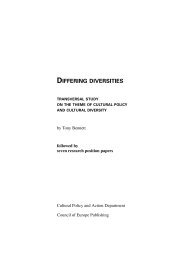Why we need European cultural policies: the impact of EU ...
Why we need European cultural policies: the impact of EU ...
Why we need European cultural policies: the impact of EU ...
You also want an ePaper? Increase the reach of your titles
YUMPU automatically turns print PDFs into web optimized ePapers that Google loves.
Cultural marketsA term used to describe a market in which <strong>cultural</strong> goods and services are traded. It refers tonational, regional as <strong>we</strong>ll as global markets <strong>of</strong> <strong>cultural</strong> goods and services.Euro-Mediterranean PartnershipThe Euro-Mediterranean Partnership (Barcelona Process) is a wide framework <strong>of</strong> political,economic and social relations bet<strong>we</strong>en <strong>the</strong> 25 members <strong>of</strong> <strong>the</strong> <strong>European</strong> Union and partners <strong>of</strong><strong>the</strong> Sou<strong>the</strong>rn Mediterranean. The latter includes ten countries around <strong>the</strong> MediterraneanSea – Algeria, Egypt, Israel, Jordan, Lebanon, Morocco, Palestinian Authority, Syria, Tunisia andTurkey. Since 1999 Libya has had observer status.<strong>European</strong> added valueThe principle <strong>of</strong> <strong>European</strong> added value describes <strong>the</strong> <strong>EU</strong> principle that anything action undertakenby <strong>the</strong> <strong>EU</strong> as a whole should complement actions undertaken by <strong>the</strong> individual member states.It is one <strong>of</strong> <strong>the</strong> funding criteria in Culture 2000, requiring projects to have a <strong>European</strong> dimension.<strong>European</strong> Economic AreaThe <strong>European</strong> Economic Area (EEA) began in 1994 following an agreement bet<strong>we</strong>en <strong>the</strong><strong>European</strong> Free Trade Association (EFTA) and <strong>the</strong> <strong>European</strong> Union (<strong>EU</strong>). It allo<strong>we</strong>d EFTA countriesto take part in <strong>the</strong> <strong>European</strong> single market without having to join <strong>the</strong> <strong>EU</strong>. The current members arethree <strong>of</strong> <strong>the</strong> four EFTA states – Iceland, Liechtenstein and Norway, (without Switzerland), plus <strong>the</strong><strong>EU</strong> and <strong>the</strong> 25 <strong>EU</strong> member states.<strong>European</strong> UnionThe <strong>European</strong> Union (<strong>EU</strong>) is a union <strong>of</strong> 25 independent states based on <strong>the</strong> <strong>European</strong> Community(founded in 1965). The <strong>EU</strong> itself was founded in 1992 after <strong>the</strong> adoption <strong>of</strong> <strong>the</strong> MaastrichtTreaty which came into force on January 1 1993. The <strong>European</strong> Union aims to enhance political,economic and social cooperation bet<strong>we</strong>en its member states. See also Transition countries.EurostatEurostat is <strong>the</strong> statistical <strong>of</strong>fice <strong>of</strong> <strong>the</strong> <strong>European</strong> Communities, established in 1953. Its task isto ga<strong>the</strong>r and analyze figures from <strong>the</strong> different <strong>European</strong> statistics <strong>of</strong>fices in order to providecomparable and harmonized data to <strong>European</strong> institutions so <strong>the</strong>y can define, implement andanalyze community <strong>policies</strong>.Intellectual property rightsThere is a body <strong>of</strong> law about rights to `intellectual property’, such as patents, copyright,trademarks, and so on.L’exception culturelleThis translates in <strong>the</strong> <strong>EU</strong> context, to mean `leaving culture out <strong>of</strong> <strong>the</strong> general rules for o<strong>the</strong>r sectors’.See also footnote 41.Annex 4 Glossary113














